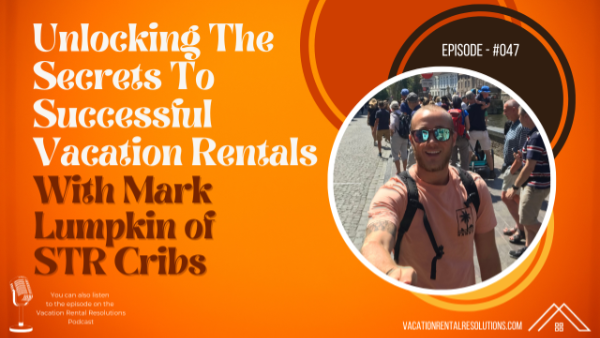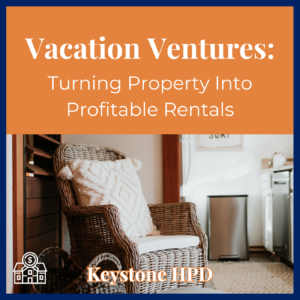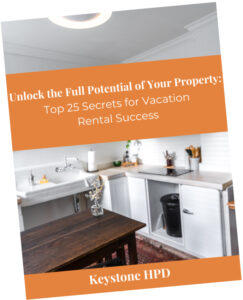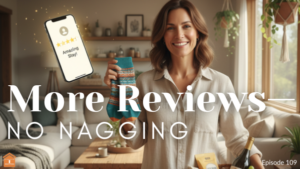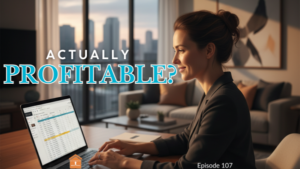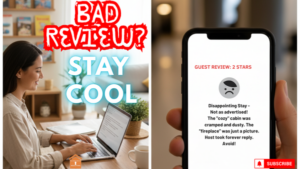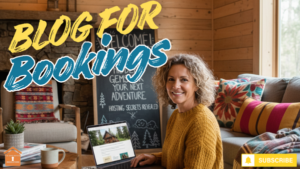Table of Contents
- 1
- 1.1 Discover how Mark Lumpkin’s insights on design, renovation, and hospitality can transform your vacation rental into a high-revenue, top-tier vacation rental.
- 1.2 How to Create a Foolproof Cleaning Checklist for Rentals-109
- 1.3 Maximising Vacation Rental Reviews Without Nagging Your Guests-108
- 1.4 How Much Should a Vacation Rental Actually Make?-107
- 1.5 How Do You Discover Your Vacation Rental Hosting Style?-106
- 1.6 How Do You Respond to a Bad Review Without Losing It?-105
- 1.7 5 Vacation Rental Blog Ideas to Boost Your SEO-104
Discover how Mark Lumpkin’s insights on design, renovation, and hospitality can transform your vacation rental into a high-revenue, top-tier vacation rental.
Welcome to this episode of Vacation Rental Resolutions! Today, we have the pleasure of speaking with Mark Lumpkin, the Sales Director at STR Cribs, an expert in Airbnb design and renovation. Mark has an impressive track record in the vacation rental industry, and we’re thrilled to have him share his invaluable insights and experiences with us.
.
Gerry: Our chat today at Vacation Rental Resolutions is with Mark Lumpkin.
He is the Sales Director at STR Cribs, an Airbnb design and renovation specialist. Mark, you have an amazing record in the vacation rental marketplace, and I really appreciate you taking the time to come and share your expertise today.
Mark: Yeah, thank you for having me on. I’m excited to chat with you and hopefully add some value to anybody listening.
Gerry: Ah, super. Okay. Are you ready for this? Ready to jump into this?
Mark: I’m ready to dive in. Ready to fire.
Gerry: Actually, before we start, I’m curious about your background. I’m really intrigued by everything you do, but I’m curious about your personal background. Share a little bit about yourself and how you got into the vacation rental niche.
Mark: Yeah, it’s interesting. I think that most of us just fall into whatever we’re doing, and maybe it’s divine intervention, but I would say that my background really started with a love of traveling. I spent some time in Europe and Southeast Asia and did a couple of cross-country road trips in the United States. If you live in a small country like Germany, it doesn’t seem like that big of a deal because you can get across the country in just a few hours, but here it’s about 4,000 miles. So, we definitely love to travel, and I stayed in a lot of different accommodations—hostels, couch surfing, Airbnb’s, hotels, tents in the middle of Switzerland.
Mark: So, we really had a wide variety of accommodations, and we realized what things we liked and what things we didn’t like. We saw people be super successful with vacation rentals or hotels because they were operating at a high level and really providing a great experience to their guests. We also saw places do really poorly because they didn’t focus on what I call unreasonable hospitality. The division between who was doing really well and who wasn’t was drastic, and I realized that the world needed to know what we had learned from our travels. So, when we came back, we started in the vacation rental industry. The United States market for vacation rentals is a little bit different than maybe Europe or Canada. Around the time of COVID, we saw some pretty heavy lockdowns. The house itself actually became a big part of the vacation.
Mark: And so, someone might have been traveling to Scottsdale, Arizona, to see grandma or play in a golf tournament or whatever it might be, spring training for baseball. That was the destination and the reason they were going, but they started to realize that the house they were staying in, they were going to spend a lot of time there. People were gravitating towards properties that had a lot of amenities and maybe had a pool or a kids’ game room or something fun and exciting about the home. So, we doubled down on that, and at STR Cribs, we create resort-style, highly amenitized vacation rentals that everyone wants to stay at. They have really high booking rates and charge, in some instances, double the market rate for a night because they have such a desirable property.
Gerry: Excellent. Now, for those who don’t know, S.T.R. means?
Mark: Short term rentals.
Gerry: Okay, perfect. Because I was actually asked that earlier today.
Mark: It’s interesting, Gerry. I’ll dive into that just for a second. There is actually a little bit of a stigma in the vacation rental world. We all know Airbnb, at least in the U.S. and I know in Europe as well, is probably one of the biggest, if not the biggest, platforms that people use to book their property, but it’s not the only way you can book a short-term rental. Airbnb has become like the Kleenex of the tissue industry. Everyone calls a tissue a Kleenex, right? Everyone calls a vacation rental an Airbnb, but it is not an Airbnb. It’s a vacation rental. You just happen to use Airbnb. So, it’s a stigma here in our industry that people say, “Oh, don’t call it an Airbnb. It’s not an Airbnb. It’s a short-term rental.” That’s where our STR Cribs was born. If you’ve ever seen that early 2000s television show called MTV Cribs, where they make a home absolutely incredible for a movie star or famous basketball player, we played on that television show and created STR Cribs.
Gerry: Okay, so you don’t focus specifically on Airbnb’s; other vacation rental properties could contact you?
Mark: Yeah, absolutely. Anyone setting up a property to be a short-term rental, whether it’s a small bed and breakfast, a house, or a boutique hotel. If you’re going to rent it for a few nights and then have a new guest come in and rent it for a few more nights, that’s our definition of a short-term rental.
Gerry: Perfect. Now, I saw something a couple of weeks ago, and I’d like your opinion. It was a headline that said, “Airbnb’s are dead.” What do you think? I’m generalizing that and thinking they probably meant short-term rentals. Everything is done. What do you think?
Mark: That is a big reason why we’re here. I would absolutely agree that if you are thinking about a short-term rental, as people did three, four, ten years ago, and trying to do what they used to do, which is just a location, a couple of bedrooms, a couple of bathrooms, an air mattress on the floor, and a hot plate in the kitchen, that business model, especially in the United States, is 100 percent dead. You cannot generate high returns because guests aren’t willing to pay a premium for that property. But if you do what we do, which is create a really highly amenitized resort-style feel, it’s absolutely not dead. The industry’s just changing. It’s changing from what used to work—the very basic setup and give them an air mattress on the floor—that just doesn’t work anymore. Guests are booking hotels for their cheaper accommodations, but when they’re traveling with friends or family and looking at the house to be a cabin in the woods or house on the beach, they want that house to be really nice. Give them an elevated experience. That journey is definitely not dead. It’s just beginning.
Gerry: So from what I’m getting, the user experience is really important in your opinion.
Mark: It’s the most important thing. It’s more important than anything else.
Gerry: Oh, that’s awesome. Here at Vacation Rental Resolutions, we have a course, and we focus on that a lot for aspiring and current vacation rental owners. Okay, I own a property or I’m looking to buy a property, and I know nothing about the industry. I’m just thinking it’d be nice to open my doors and maybe make a few bucks on the side. What do I need to consider before I make any calls or do anything?
Mark: I think that you need to consider a couple of things. One, you need to consider the regulations. We’ve seen headline after headline, even Barcelona was the most recent one, the next five years, they’re going to shut down 10,000 short-term rentals. I stayed in short-term rentals in Barcelona, and that’s crazy to me. So, you want to look at regulations. I think that places that already have established regulations are a better investment for you to go into because you know what to expect. If you go into a market that is “the wild west,” where there’s no regulations and everyone’s doing whatever they want, sometime in the near future, there will be regulations. I like to go into a market that already has regulations. I can read the rule book, and as long as I abide by it, I know that city is short-term rental friendly, and they’re most likely not going to drastically change their regulations. So that’s one thing. The next thing is the competition and the guest demographic. How much competition do I have? What’s the quality of the competition? Are people doing a really good job, or is this an underserved market where most of the homes just aren’t great experiences, and I can come in with an elevated product and beat everybody out? So, I’m looking at my competition, what there is, how much there is. And then I’m looking at the guest demographic. Who’s coming, and why are they coming? Am I in Nashville, Tennessee, which sees a lot of bachelorette and bachelor parties and young folks coming to experience live country music in a party town, or am I in Aspen, Colorado, where more affluent people come to the ski resort and older couples? I really like to dive into who’s coming, how many people are coming, what kind of money they’re spending, and then create a product for those people. So it might be a gap, it might be a couple’s retreat that does better in a certain market, and it might be a family-friendly property that does better in other markets. So I really like to look at those three factors.
Gerry: And where do you gather this data? How do you find this?
Mark: It’s all inexpensively or readily available, at least in the U.S. So you’re going to use tools like AirDNA. You can get a relatively inexpensive subscription to that for maybe $10 a month or $15 a month. They’re going to give you all of your competitive data. What are the comps? What is everybody doing in your market? Oftentimes, just a Google search will tell you how many tourists travel to this market every year. What’s their demographic? There’s a lot of great travel data online that’s free. And then there are a lot of great resources on social media. So I’ll look through maybe those Facebook groups for vacation rental hosts and see what people are talking about, maybe propose a question. You can also reach out to those local property managers. If I’m interested in a house in Miami, Florida, I’m going to call three or four property managers and get their opinion. “Hey, if I open up another house, would you consider managing it for me? If you did, how well would it do? What do you think? Give me some insight.” So I like to gather some insight from locals as well.
Gerry: Oh, excellent. Okay, so I’m thinking about opening a vacation rental. I heard that you’re the person I should talk to. I give you a call, not really knowing what to expect. Walk me through the process. What are you going to tell me? What are you going to offer me?
Mark: Sure. Our service is hyper-focused on setting up the property. When you’ve identified a property and you’re going to buy it, whether it’s a one-bedroom, one-bath condo or a ten-bedroom, ten-bath mansion on the beach, it doesn’t matter the size or the scope of the work. We’re focused on taking it from where it is, whether that’s empty or partially furnished, brand new construction, or in need of heavy renovations. It doesn’t really matter what the asset looks like today, but what’s the game plan to get it from where it is today to where it needs to be for that first guest to come in and unlock the door and have a great experience and a great stay. So I’ll walk you through that game plan for an individual property.
Mark: Usually, that conversation is best had after someone identifies a property that they’re interested in. We’ll look at a few things. We’ll look at how much work needs to be done, how expensive that work is going to be, what’s necessary and unnecessary. The famous term in real estate renovations is that the kitchen and the bathroom are the best investments in your property, right? You’ve heard that plenty. If you’re going to buy a home, invest and make the kitchen nice and invest in the bathrooms. Everything else doesn’t matter. It’s quite the opposite in short-term rentals. People don’t typically care about the bathrooms and the kitchen, as long as they’re clean and functional. They’re actually looking at other things. I heard some crazy statistics that folks spend 60 percent of their time in your vacation rental in their bed sleeping. So if you look at a 24-hour day, you might be out doing fun things for four or five or six hours a day. You’re in the house for ten hours a day and sleeping for seven or eight of those. So you spend a vast majority in the bedrooms. Bedrooms and the living room are actually the places we highly recommend you invest in. So we’ll walk you through where the money should be spent, what we can do to improve the property, what we can do to differentiate the property. Maybe you need a hot tub because no one else has a hot tub. Maybe it is a pickleball court if you’ve got a big backyard and it’s an area that groups are going to be traveling to. We’ll really walk through that. We’ll give you a timeline and a budget. Is this a four-week project? Is this a twelve-week project? You need to know that because you’ve got to factor in your holding costs and cash flow and all those things. Yeah, we’ll go from there. That’s really what we walk through at the very beginning of a conversation with us. If we’re on the same page, we usually kick projects off and get them going quickly.
Gerry: You mentioned budget. I open up a property, let’s say in Miami, using your example. What kind of budget should I have in the back of my mind? It doesn’t have to be dead on, but ballpark, what should I be thinking?
Mark: It’s a good question. It’s hard to say because it very much depends on the asset and on the piece of property. Are you buying a brand new construction home that’s in great condition and just needs furniture, decor, and a hot tub? Or are you buying a home that’s run down, hasn’t had a fresh coat of paint in 30 years, and needs a complete facelift and carpets removed? But in general, I see folks, and remember, we don’t typically do a lot of small properties. These are maybe three, four, five-bedroom homes. We see folks investing six figures into the properties, and it ranges somewhere between $75,000 to about $150,000. That’s to really create a very unique experience and have a property that stands out above the rest.
Gerry: Do you feel it’s important for me as an owner to be hands-on working with you? Or should I let you do it and then hope for the best?
Mark: That’s a great question. We always encourage owner participation, and I always like to tell people, “Hey, have you stayed in your property? You should go stay in your home. You should be the first guest to check in and spend a week. When you wake up in the morning and you need a hairdryer to blow your hair and you realize, oh crap, I don’t have a hairdryer, guess what? Your guests are going to feel the exact same thing, and you better go get a couple of hair dryers.” So I always encourage property owner participation throughout the process. It’s just going to give you a great experience for your guests when you’re hands-on. But your level of participation depends on you as an individual. That doctor who works in California and has a busy schedule is probably not going to participate as much in his cabin in Tennessee as maybe the retired folks who live five minutes down the road from the property they’re setting up. It really depends on the individual. But I always think you should have some level of participation.
Gerry: Oh, that’s great advice. I swear by that. I’m shocked at how often I’ve talked to owners, not only vacation rentals but actual hotels, who have never slept in their own properties. It boggles my mind. Alright. Now, you suggested the budgets. You’d come in and assess my property. You’d put together a budget. We all know in a perfect world, that budget’s going to be dead on, and there are never going to be any other issues. In a perfect world. That’s not the case. There’s always going to be something else that comes up. Do you recommend that I maybe add a buffer to the budget you recommend? Or would you do that?
Mark: I don’t think it would hurt to have a buffer. We typically try to give a range. So we’ll say, “Hey, maybe this is a $50,000 to $60,000 budget” or whatever. We try to give a range at the beginning so that things are subject to change, right? There’s always decisions to be made along the way. “Hey, we thought we were going to do a queen bed in this room, but after we got measurements, it actually seems like a king bed would be better.” And then there are a lot of little decisions you make that change your budget one way or another. Obviously, whenever you’re doing renovations, there’s the unknown. “Hey, we went to replace these floors, and the bathroom floors are rotted out. We’ve got to replace the subfloor.” Things like that definitely happen. So yeah, I would recommend giving yourself a little bit of a buffer.
Gerry: Do you have a percentage that you work with?
Mark: Yeah, I think that if you gave yourself somewhere between a 10 to 15, maybe 10 to 20 percent buffer on any given project, you’re probably going to be safe. We’ve done 500 setups, and we do a pretty good job on the front end of letting people know what it’s actually going to take.
Gerry: Wow, okay, 500. That’s impressive.
Mark: Yeah, it’s been a journey.
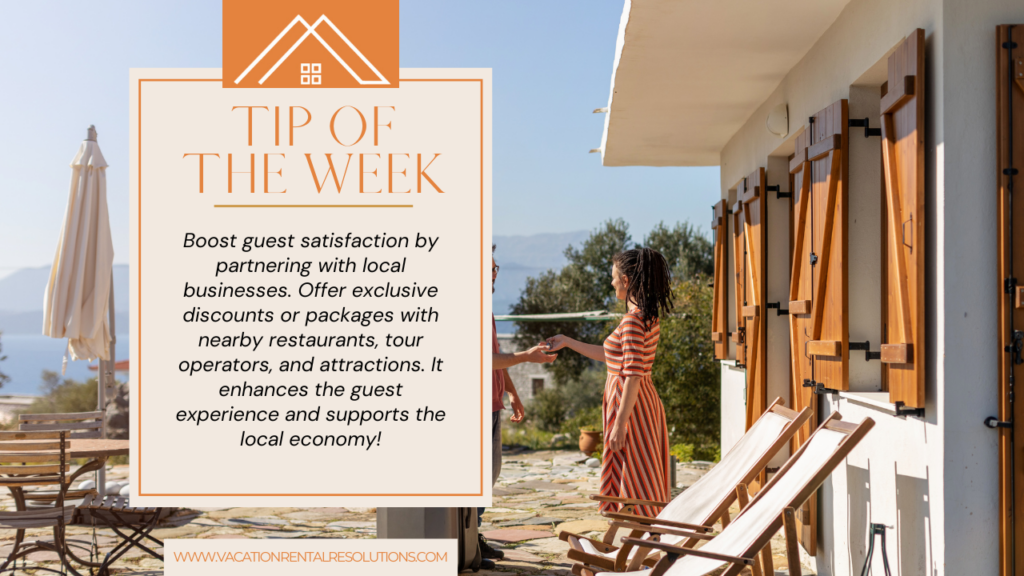
Gerry: Okay. Is there a way I could generate more income other than the heads in beds, just the nightly rental? Are there any other options for vacation rental owners?
Mark: Absolutely. There are dozens of options. The first one I can think of is pet-friendly. If you can get a property that is fully fenced and you set up the home to be pet-friendly, you’re going to generate a higher ADR, and you’re going to have more bookings. I think a third of all travelers in the U.S. are traveling with pets, and most vacation rentals are not pet-friendly. So that’s one. The second one is a kid-friendly property. Something as simple as maybe a few thousand dollars invested into the property to give you a pack-and-play, a high chair, toys, reading material, a baby gate—some of those really basic things that aren’t very expensive. You put together this little pack that’s in a closet, take a very nice, beautiful picture of it, and advertise this property as kid-friendly. You’re immediately going to attract a higher ADR and more guests. A lot of folks, myself included, are traveling with small kids, and it is so nice to show up at a property that just has some of the most basic things. Trying to feed a two-year-old that doesn’t have a high chair is a pain. A high chair costs $50 at Walmart. They’re not expensive. They’re completely made out of plastic. They’re easy to wipe down. No one’s going to ruin them. There are very small things that you can do to really accommodate a wide range of guests. I’ve also started to see a trend with…I don’t know the exact phrase, and so forgive me if this is not politically correct, but handicap accessible properties.
Gerry: I was going to talk about that. That’s good. Okay.
Mark: I didn’t personally think about this really until Christmas last year. My grandpa’s got a prosthetic leg, and my grandma asked. We were getting two big houses on one property, and the first thing she asked is, “Hey, is this handicap accessible?” And I thought, gosh, I didn’t think about that. I don’t know if it’s handicap accessible. Do you have the wider doors? Do you have the shower that doesn’t have a step-up but has the bar? There are all kinds of small things you can do to accommodate people who maybe have more needs on that front. I’ve started to see properties branding themselves as available
to people with some more needs. And what else? I would say, really, at the end of the day, it’s doing that data dive for who your guest is going to be and setting up a home that would best accommodate them. Do I have a property that is two minutes from this golf course and two minutes from that golf course? I know that a lot of folks coming to my house are playing golf at those golf courses. Great. What can I do to enhance their experience? Can I do a little mini putt in the backyard? Could I do a golf simulator in the garage? Could I have a spot to park a golf cart? Could I have a golf club cleaning station in the backyard? There are all kinds of little creative things you could do to where when someone is going to take their vacation and they’re looking through homes, your listing jumps out at them and says, wow, those people thought about my experience, and this house is going to be the best for my stay. You’re always going to win if you do that.
Gerry: Oh, that’s excellent. Okay. 500 projects you’ve worked on.
Mark: Correct.
Gerry: What are some of the most unique amenities you’ve seen? First of all, are they important?
Mark: That’s a good question. If you’re trying to lose weight, is a personal trainer important? Sure. A personal trainer can be very important to your success. But the first step is just going to the gym, right? If you’re saying, “I’m trying to lose weight, but I’m not willing to exercise because I got to find the best personal trainer,” that’s irrelevant. These very high-dollar amenities are very important, and they can drive ROI and differentiate your property. But if you don’t have the most basic things like blackout curtains, a full-length mirror, extra pillows and blankets, things like that, and if your property’s not clean, those extra amenities don’t even matter because you haven’t taken care of the basics first. What I would say to the industry as a whole, anyone looking to invest in vacation rentals, is get the basics done first. You don’t have to go spend $200,000 to make your property better than everyone else’s. Yes, it helps. If you want a top 1 percent listing, you need to do those things. But with the most basic strategic thinking and thoughtful amenities, like I said, blackout curtains, full-length mirrors, things like that, you’re going to get a top 10 percent property because no one else is thinking about those things. Start with the basics and then work your way up to the really high-dollar amenities.
Gerry: I have a property, but I don’t have a ton of money. Are there any ways you could share that could help increase my revenue in the short term and improve the guest experience before I make major investments?
Mark: To tie into what we talked about in the last two questions, just go stay at the property. Live there for a week or two and amenitize it with the small things that you need that aren’t costly. If you don’t have hair dryers, you need hair dryers. If you don’t have blackout curtains, blackout curtains are maybe $30 or $40 a panel. Invest a few hundred dollars and get blackout curtains. You can add a lot of small things to really improve your property. The pictures are going to be your absolute gold mine. I always recommend, if you had your last $500, give your last $500 to a professional photographer to take professional photos.
Gerry: Oh, absolutely.
Mark: iPhone photos are unacceptable. Stage it, turn the television on. If you’re at the beach, turn the television on with a nice photo of the beach that you’re at in the background. Turn on all the lights, make sure the beds are made. Don’t have your dog sitting in the corner in a pile of junk. Get professional photos. If that’s your last $500, that’s where you spend it.
Gerry: I couldn’t agree with you more. Okay, this has been awesome. Is there anything that I might have missed asking you that the listeners should know?
Mark: No, I think you asked a lot of great questions. I know you asked about “Is Airbnb dead?” I don’t think so. I think there’s a lot of opportunity in this industry. I just think it’s changing. Just like everything, right? You’re always adapting and changing, and the new adjustment and change is better guest experience and better properties. That’s how you win. If you’re not thinking about that, I don’t think this is the best industry for you to get into. You’re in the hospitality industry. You worked in the hotels. You know how hard this is. I listened to your podcast where you talked about thinking it was going to be easy and just checking people in and making sure the beds are made. That is the mindset of a lot of vacation rental investors. Make sure they get checked in and make sure the beds are made. I can assure you that is not the recipe for success. This is hard. There is a reason that five hotel companies own 99 percent of the hotels on planet Earth because it’s freaking hard, and this is no different. So put your big boy pants on, be prepared for 2 a.m. calls and just the most outlandish, wildest things that you could ever imagine. They’re going to happen. If you’re not up for that challenge, then go invest in multifamily syndications because this is a lot of work, it’s labour-intensive, and it takes a lot of blood, sweat, and tears.
Gerry: Oh, Mark. This has been awesome. God, I really appreciate it. This has given everybody a lot to think about. If anyone would like more information, how can they reach out to you?
Mark: I’m very active on LinkedIn, so you can follow me, add me, send me a connection request. I’m happy for you to share my email address with anybody if you want to drop it in the show notes.
Gerry: Oh, I’ll put it in the show notes.
Mark: Yeah, so please reach out to me. It doesn’t matter if you’ve got a property in Europe, and we don’t service that market, or if you’re just a first-time investor asking some questions. I’m always happy to throw 15 minutes on the calendar and chat with anybody. No obligation. Just how can we help? What value can we add to you? Please reach out.
Gerry: This has been great, Mark. Thanks so much for taking the time. I really appreciate it. We’ll be talking again.
Mark: Cool. Thanks, Gerry. Yeah, I look forward to connecting again and love what you’re doing.
Gerry: Thanks.
If you’re still scratching your head on how to nail this whole vacation rental game, I’ve got something special for you! Dive deeper into our free PDF, ‘Unpacking Your Property – The Top 25 Secrets to Successful Vacation Properties’. Trust me, this is the cheat sheet you didn’t know you needed!
.
.
.
This has been an incredible discussion with a wealth of information. Mark’s expertise and advice will undoubtedly help many aspiring and current vacation rental owners. For those who want to learn more or get in touch with Mark, you can reach out to the:
STR Cribs Website: https://strcribs.com
LinkedIn: https://www.linkedin.com/in/mark-lumpkin-84b173142
Email address: mlumpkin@strcribs.com
.
I would encourage you to check out Mark and STR Cribs.”
.
In the next episode, I will talk about Vacation Rental Tax Deductions.
⇒ TO READ OR LISTEN TO THIS EPISODE ON KEYSTONE HOSPITALITY PROPERTY DEVELOPMENT
.
Serious about taking your business to the next level? Sign up for the “Vacation Ventures: Turning Property Into Profitable Rentals” course
.
Grab your copy of the “Unlock the Full Potential of Your Property: Top 25 Secrets for Vacation Rental Success” PDF
vacationrentalresolutions.com/25-secrets-for-vacation-rental-success
.
Join our groups
.
Listen to The Hospitality Property School PODCAST here
Vacation Rental Resolutions Podcast
.
YouTube Channel
Gerry MacPherson
A Division of Keystone Hospitality Property Development
How to Create a Foolproof Cleaning Checklist for Rentals-109
- Gerry MacPherson
- February 12, 2026
Maximising Vacation Rental Reviews Without Nagging Your Guests-108
- Gerry MacPherson
- February 5, 2026
How Much Should a Vacation Rental Actually Make?-107
- Gerry MacPherson
- January 29, 2026
How Do You Discover Your Vacation Rental Hosting Style?-106
- Gerry MacPherson
- January 22, 2026
How Do You Respond to a Bad Review Without Losing It?-105
- Gerry MacPherson
- January 15, 2026
5 Vacation Rental Blog Ideas to Boost Your SEO-104
- Gerry MacPherson
- January 8, 2026

